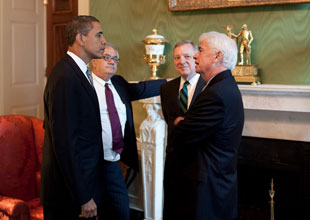
Flickr/<a href="http://www.flickr.com/photos/f-l-e-x/1449291608/">f-l-e-x</a> (<a href="http://creativecommons.org/">Creative Commons</a>)
The next big battle in Washington—one that will heat up fast if the health care tussle is ever resolved—will be fought over reform of the financial sector. In recent weeks, President Barack Obama has gone on the offensive, calling for new restraints on Wall Street wheeling and dealing and vowing to veto weak legislation. In December, the House passed a robust package of reforms. The action has now shifted to the Senate Banking Committee, and chairman Sen. Chris Dodd (D-Conn.) has pledged to push a comprehensive package over the finish line before he retires at the end of the year. But it won’t be easy. The big banks and their lobbyists are vigorously resisting a rewrite of their operating rules and working hard to insert loopholes and exclusions that would gut the legislation. Obama can prevent that from happening by spelling out the benchmarks the legislators must meet to avoid his veto pen. The details of financial reform can be complicated. But it’s not hard to come up with the must-have provisions. Here are five that the White House should insist upon to make sure we get financial reform that works, not just window dressing.
1) Fix the big picture, not just individual firms.
We learned the hard way that the possibility of failure is an essential pillar of a stable financial system. When firms become “too big to fail,” they take excessive risks, crowd out smaller firms, and are costly to bail out—and the failure of one can threaten the whole economy. Successful financial reform would include a mechanism to survey the balance sheets of particular firms according to the risks they pose to others, not just to their shareholders or depositors. Currently, no single entity is assigned to ensure system-wide stability and detect excessive risk taking. There must be an agency with the authority to monitor threats to the marketplace and prevent the failure of any individual firm from having a cascading effect. Europe is on a path to create a Systemic Risk Board, comprised of the national central banks, to perform this function, and the United States ought to follow suit.
The House bill sought to create a Financial Oversight Council, which would include members of the Federal Reserve and the existing bank regulators. Senate negotiations are considering establishing this new authority within the Treasury Department, but with a role for the Fed and others. More important than the bureaucratic location is the precise nature of this new authority. It won’t mean much if it ends up as a flag-waving exercise. Instead, the regulators awarded this authority must have preeminence over the existing bank regulators and the power to quarantine contagion. They must be able to require specific firms to increase their capital holdings and alter their risk-management practices. These regulators even have to be empowered to break up companies whose size and interconnections with other firms endanger the entire economy.
2) Separate retail banking from the casinos.
Before the meltdown, banks and other financial institutions made bets with other people’s money that ultimately soured their balance sheets when the wagers didn’t work out. For each firm, there has to be stronger oversight, along with higher capital requirements and other rules that increase transparency and accountability. These rules can protect both bankers (from themselves) and the depositors who rely on these firms to protect their assets and provide credit. After excessive risk-taking brought on the Great Depression, the Glass-Steagall Act of 1933 required banks to spin off or shut down their brokerage and investment activities. For almost 70 years, this law drew a line between banks that the government could backstop and those that behave like casinos and hedge funds. The act was repealed in 1999, and many have been calling for its resurrection. But the sideline businesses of today are different. Back in the 1920s, if banks were underwriting a stock that had trouble selling, they would buy it with money from their depositors’ accounts. Now, a bigger problem is proprietary trading: when securities are bought and sold with a firm’s own money to generate a profit for itself. Consequently, the White House has called for a new rule, named for its most vocal proponent, former Fed Chairman Paul Volcker, to ban proprietary trading. The Volcker rule is a must for financial reform because, like the original Glass-Steagall Act, it would separate (and protect) retail banking from other riskier endeavors and also cause firms to become smaller. Dodd has indicated he may think it’s wise to postpone this reform in order to get a deal done, but the White House should insist on its inclusion in the final bill.
3) It’s the consumer, stupid.
The next regulatory regime should be designed with the consumer, not just the banks, in mind. There needs to be a new set of consumer protections—such as preventing banks from changing overdraft fees to cash in on the increased use of debit cards. (This practice created a $26 billion windfall for the banks almost overnight.) These protections should be set and policed by a new Consumer Financial Protection Agency. For this CFPA to work, it would need teeth and latitude to fight all sorts of predatory behavior engaged in by banks and nonbanks, such as subprime mortgages and payday lending. The House approved the creation of an independent agency, which would possess the authority to treat consumer issues on par with the “safety and soundness” standards employed by other bank regulators. To attract support of Republicans who have balked at establishing an autonomous agency, Dodd is looking for a compromise. One idea, recently floated, is to create a Bureau of Financial Protection within the Treasury Department. This bureau would be charged with promoting consumer protection, but would be required to consult with existing bank regulators before new rules are issued. And if there is a conflict, these regulators would be allowed to appeal up the chain. To be successful, a new authority has to have both rule-making authority and strong enforcement mechanisms. Without these tools, it will get endlessly rolled by the existing regulators.
4) Keep it simple.
Current rules allow firms peddling deceptive financial products to bury their scams in the fine print. Credit card companies charge hidden fees when a card holder pays over the phone, inquires about a new loan, or transfers an account balance from another card. Similarly, the mortgage industry makes money by steering borrowers away from standard 30-year fixed loans and toward higher-priced, subprime loans. These are unfair practices, even if they are covered by contracts signed by consumers. Profits should not be made by tricking people into products they don’t need or understand. Instead, rules that govern the market for financial services should be written to take into account how consumers behave. As the burgeoning field of behavioral economics has shown, too much information can easily overwhelm. If we can streamline information disclosure, we can make the financial services marketplace more competitive by price. Providers must be clear about the costs of their products and offer standard low-risk products. Future market rules should be governed by a new set of standards and encourage transparency, simplicity, and fairness in products offerings. The House bill made sure that promoting these principles would be a centerpiece of the reform effort when they defined the mission of a new CFPA in precisely these terms. The White House must ensure that the Senate does the same.
5) And for heaven’s sake, limit executive pay.
Wall Street’s plan to return to the outlandish compensation packages that pervaded the industry prior to the meltdown may be grounds for making tone deafness a crime. A successful financial reform package must do what the firms cannot: impose restraint. Specifically, the bill should mandate a “say on pay” rule that would grant shareholders a strong role in approving (or disapproving) executive pay packages. Also, the SEC should be required to step in to make sure firms create truly independent compensation committees to set appropriate pay levels. And a new set of shareholder rights rules should be implemented that would allow shareholders to nominate individuals to a firm’s board of directors, to examine a clear description of executive compensation, and to claw back unearned performance-based pay. These rules are in the House bill, but the Senate is being lobbied heavily to do nothing on this front.
There are plenty of details to work out—and debate—while rewriting the complex rules for the financial industry. But the public will be able to evaluate what emerges from the messy legislative process—and to judge whether or not Obama should accept the measure—by looking to see if these five standards have been met. And here’s a final tip that will tell you whether a final bill contains the right tools to produce real reform: The big bankers won’t sign on.













